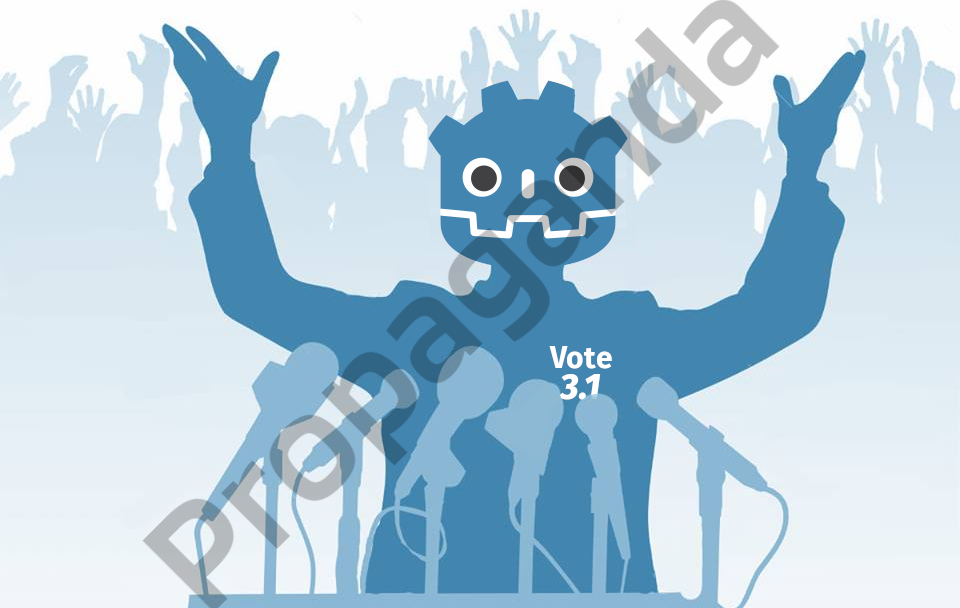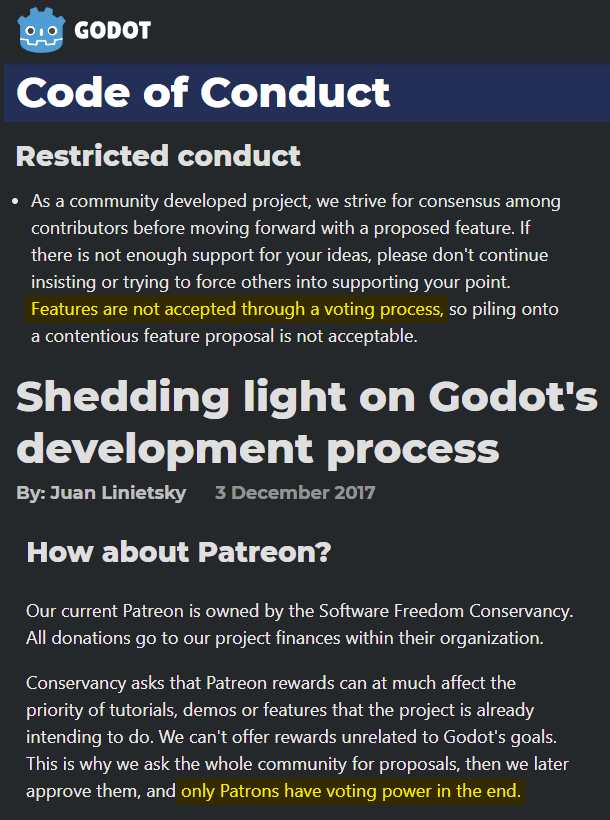Democracy
Is Godot a democracy? The short answer is: definitely not. When people ask this question, even the project manager of Godot says along the lines of:
Godot is in no way a democracy.
But why does Godot leadership keeps depicting it as such? For example, when they write news articles about Godot, they show images of a “Godot candidate” that you can allegedly “vote” for1:

Another example is when lead developer writes an article on April’s Fool, suggesting that Godot “democratizes development”2:
We also want to democratize game development. As you know, Godot Engine developers and other members of the community have always listened to your concerns, troubleshot your problems, fixed bugs you reported, implemented many of your suggestions and merged untold numbers of pull requests. This may have sufficed at one point in our history, but can continue no longer, as it’s clearly a greivous form of communism, and communism is the enemy of democracy.
Of course, this is framed as a joke, but they walk a fine line with ambiguity to make it seem like their development is based on democratic principles. As a result, users who aren’t familiar with how open-source works tend to believe that Godot operates like a true democracy. Unfortunately, this misconception is common among regular users in the Godot community, especially since many of them are hobbyists.
While there’s a difference between democratic values and democratic governance, Godot as a project creates the false impression of being democratically governed. For instance, many users mistakenly believe that features are approved through a voting process. In reality, this isn’t the case. According to an article by the lead developer on Godot’s development process, only those who financially donate to the project have the right to vote.3:

According to Godot’s Code of Conduct, “features are not accepted through a voting process.”
As a community developed project, we strive for consensus among contributors before moving forward with a proposed feature. If there is not enough support for your ideas, please don’t continue insisting or trying to force others into supporting your point. Features are not accepted through a voting process [emphasis added], so piling onto a contentious feature proposal is not acceptable.
However, in the article “Shedding Light on Godot’s Development Process,” they also claim that “only Patrons have voting power in the end.”
Conservancy asks that Patreon rewards can at much affect the priority of tutorials, demos or features that the project is already intending to do. We can’t offer rewards unrelated to Godot’s goals. This is why we ask the whole community for proposals, then we later approve them, and only Patrons have voting power in the end [emphasis added].
I hope you see the contradiction here: if features aren’t accepted through a voting process, then no one should be voting on anything, which means Patrons shouldn’t have voting power either. Don’t blame me if this doesn’t make sense—it’s Godot’s leadership that’s created these inconsistencies and contradictions! 😁
This creates different tiers of users and developers in the eyes of Godot’s leadership, depending on whether they financially support the project. This approach might be acceptable for a community-informed project, but Godot claims to be community-driven, where decision-making is typically based on do-ocracy. This means that those who contribute can also decide which features to work on, based on votes from the Godot Improvement Proposals. In a truly community-driven project, such decisions shouldn’t depend solely on Godot’s leadership and the financial contributions of voters.
Even then, as you’ve hopefully read in Waiting for Philosophy chapter, there’s apparent chicken-or-egg problem: one cannot prioritize features through voting if vision and mission of Godot are not defined in the first place, and Godot’s roadmap keeps changing in accordance to their mood.
You’ll also find that Godot’s leadership co-founded a commercial company called W4 Games. If you go to their LinkedIn page, you’ll see yet another instance of this so-called “democratization”, quote:
W4 Games is an Irish start-up which plans to revolutionize the online gaming market with a cloud platform based on open source technology, which will unlock and democratize [emphasis added] the online multiplayer market for all independent developers.
On top of that, in an article by Bryant Francis on GameDeveloper.com, where the author interviewed Juan Linietsky and Rémi Verschelde, it’s mentioned4:
But Godot’s open-source nature means features can’t just be solicited like they are from a licensed engine. They have to be voted on [emphasis added] and implemented by the community.
That said, if the Godot leadership had decided to create a commercial company for Godot while claiming they want to democratize the market for developers, you’d expect the open-source Godot Engine to reflect those same values, right? But in reality, that’s not the case. The leadership is content to keep things vague, attracting people who thought features would be decided by a vote. Who wouldn’t want to feel like their voice matters, right?
Conclusion
If you’re a Godot contributor, don’t be misled by the number of thumbs-up or user support your proposal receives. If donors or sponsors don’t vote for it, your proposal will likely be left in limbo. Even more troubling, donor votes might be ignored by Godot’s leadership. Donors, who expect transparency, may find themselves waiting indefinitely for features they supported, all while refusing to admit they’ve been fooled. The more invested they are, the harder it becomes to accept the truth. Moreover, the legitimacy of the voting process is highly questionable. It’s alarmingly easy to disguise a unilateral decision as a community choice when you have a loyal fanbase that trusts you unquestionably. In Godot’s case, this trust is clearly being exploited, as you’ll find out in the next chapters.
References
Release candidate: Godot 3.1 RC 2 - By Rémi Verschelde.
Godot is now really free! - By Juan Linietsky.
Shedding light on Godot’s development process - By Juan Linietsky.
Godot founders had desperately hoped Unity wouldn’t ‘blow up’ - By Bryant Francis, Senior Editor at GameDeveloper.com, September 5, 2024.